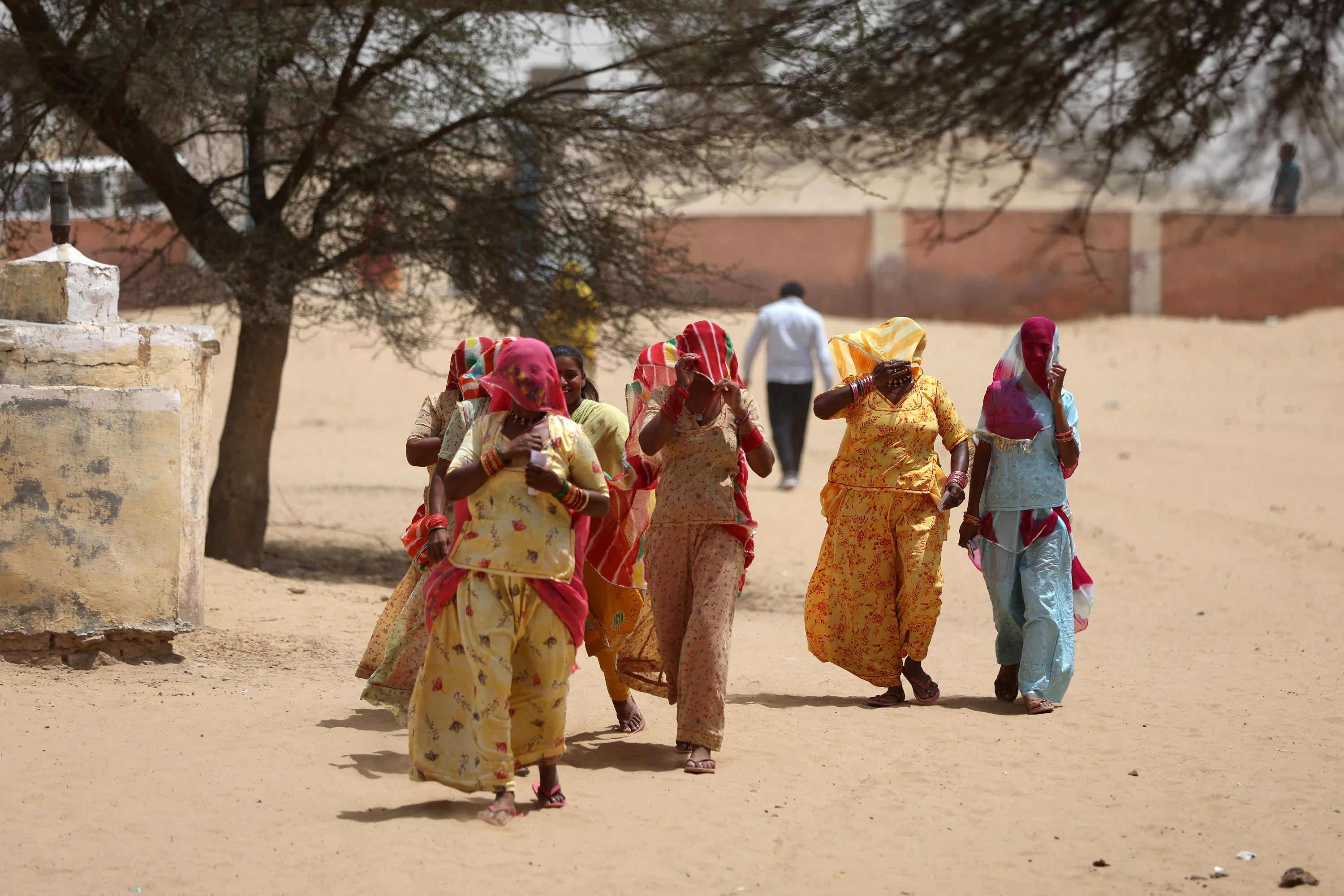the World is getting warmer, and periods of extreme heat more common. The heat wave in Sweden in the summer is estimated to have caused several hundred deaths.
Knowledge about climate change health impacts have been in existence for many years but the effects have proven to be far much more serious than what we previously understood. It threatens health and life, particularly among vulnerable groups like the elderly and those suffering from chronic illness such as cardiovascular disease, diabetes and lung disease.
“The Lancet Countdown on health and climate change” in the medical journal The Lancet. the Report provides an annual update of how climate change is affecting public health in the world up to the year 2030. It underlines that the extremvärme as the world increasingly experiencing harms human health, threatens and takes lives and the burden on health care increases more and more. The proportion of vulnerable to heat are increasing in all the world's regions.
But climate action is threatened with 50 years of medical progress of the increasing health problems, refugee flows and poverty that climate change is contributing to.
heat Stress is an early and serious effect of climate change. It is becoming more common, and we and the systems we rely on, are ill-equipped to cope with the new situation.
In Europe and countries along the eastern Mediterranean sea is more than 40 per cent of people over 65 years of age vulnerable to heat exposure. There is a higher vulnerability compared with that seen in Africa and south-east Asia and the explained by an older population who live in urban environments.
the Heat exacerbates air pollution significantly in urban areas. The combination of heat and harmful air pollutants like ozone and particulate matter further increases the risk of death and increased morbidity.
Last year were 157 million more people in the vulnerable groups for a heatwave compared with the year 2000, and 18 million more compared with 2016.
. In Sweden, high temperature is often significantly higher inomhustemperaturer which contribute to deaths and increased risk of such as stroke, heart attack, and respiratory problems. The problems become greater the higher the future global temperature will be. It is urgent.
Climate change is affecting the spread of infectious diseases, the small changes in temperature and rainfall can produce large changes for the vector - and waterborne diseases.
Dengue is a subtropical mosquito-borne infectious disease that has the greatest spread in the world and, according to the world health organization is the most serious. For dengue fever to spread to new areas requires a combination of the right kind of mosquitoes, virus, season, temperature and regnförhållanden. The first outbreak in the Sydeuorpa com 2010. With continued climate change, the disease within 50 years established brand in southern Europe, with possible outbreaks in the north. Something that is expected to happen in our, our children's and grandchildren's lifetime. According to the Lancet Countdown has denguemyggornas ability to spread the virus increased by ten per cent in the late 50's, with 2016 as the peak year.
. When the surface water temperature goes above 16 degrees celsius, the conditions for the growth of bacteria favorable and the relative risk of infection increases by 14% per degree. The risk of serious wound infection and sepsis is particularly high among the elderly and the immunsvaga people and the mortality rate can be high. According to the Lancet Countdown, so be seen a clear trend globally, with more coastal areas, which fits vibriobakterien. In two areas, the Baltic sea and the northeastern united states, has gynnsamheten increased by 24 and 27 per cent in the 2010s, compared with the 80's, with a 5 weeks longer risk period for infection.
It is also about the economy. In 2017, was lost, according to the Lancet Countdown 153 billion of working hours because of the heat, an increase of more than 62 billion hours since the year 2000. The direct effects of climate change also extends beyond the heat extensive extreme weather. In 2017 resulted in a total of 712 climate-related extreme weather events in a total of 326 billion u.s. dollars in economic losses during the year, almost three times as much as compared with the total losses of the year before.
, either directly through extreme weather events or indirectly through the overload caused by a greater disease burden. The trends we see show unacceptably high risks for human health today and in the future.
Lancet Countdowns annual reports can help us to understand the price of inaction, and be used to drive the ambitious efforts for the transition to a fossil-free future. Research on public health and climate change contributes with both knowledge and motivation for the implementation of the necessary conversion measures.
It is about the effects of climate change on human health, but also about how the more healthy communities and lifestyle choices can have a positive effect on both human health and our climate. Many of the measures needed to combat climate change is of immediate benefit to public health. Local air pollution caused by fossil fuels in cities kills nearly three million people annually worldwide, of which 500 000 in Europe, according to the Lancet Countdown. To solve växthusproblemet will give a simultaneous win with cleaner air and better public health.
however, There are limits to how much even the strongest systems can reduce health risks by adaptation, if too little is done to reduce the cause, namely greenhouse gas emissions.
But climate action is threatened with 50 years of medical progress of the increasing health problems, refugee flows and poverty that climate change is contributing to. The life we live today and the world as we know it today is at stake. The scientific evidence may no longer be ignored. It is urgent.
Let the effects be the alarm clock that gets the consequences of climate change to be an equally pressing issue at home at the kitchen table at klimatförhandlarnas table in Katowice.
Climate change can be compared with a ”medical emergency”. It is a serious diagnosis, but the good news is that if we act right, it may prove to be the most important thing that is done for global health in our time, and we know the cure.

 Germany: the trial of an AfD leader, accused of chanting a Nazi slogan, resumes this Tuesday
Germany: the trial of an AfD leader, accused of chanting a Nazi slogan, resumes this Tuesday New York: at Columbia University, the anti-Semitic drift of pro-Palestinian demonstrations
New York: at Columbia University, the anti-Semitic drift of pro-Palestinian demonstrations What is Akila, the mission in which the Charles de Gaulle is participating under NATO command?
What is Akila, the mission in which the Charles de Gaulle is participating under NATO command? Lawyer, banker, teacher: who are the 12 members of the jury in Donald Trump's trial?
Lawyer, banker, teacher: who are the 12 members of the jury in Donald Trump's trial? What High Blood Pressure Does to Your Body (And Why It Should Be Treated)
What High Blood Pressure Does to Your Body (And Why It Should Be Treated) Vaccination in France has progressed in 2023, rejoices Public Health France
Vaccination in France has progressed in 2023, rejoices Public Health France Food additives suspected of promoting cardiovascular diseases
Food additives suspected of promoting cardiovascular diseases “Even morphine doesn’t work”: Léane, 17, victim of the adverse effects of an antibiotic
“Even morphine doesn’t work”: Léane, 17, victim of the adverse effects of an antibiotic Orthodox bishop stabbed in Sydney: Elon Musk opposes Australian injunction to remove videos on X
Orthodox bishop stabbed in Sydney: Elon Musk opposes Australian injunction to remove videos on X One in three facial sunscreens does not protect enough, warns L'Ufc-Que Choisir
One in three facial sunscreens does not protect enough, warns L'Ufc-Que Choisir What will become of the 81 employees of Systovi, a French manufacturer of solar panels victim of “Chinese dumping”?
What will become of the 81 employees of Systovi, a French manufacturer of solar panels victim of “Chinese dumping”? “I could lose up to 5,000 euros per month”: influencers are alarmed by a possible ban on TikTok in the United States
“I could lose up to 5,000 euros per month”: influencers are alarmed by a possible ban on TikTok in the United States Dance, Audrey Hepburn’s secret dream
Dance, Audrey Hepburn’s secret dream The series adaptation of One Hundred Years of Solitude promises to be faithful to the novel by Gabriel Garcia Marquez
The series adaptation of One Hundred Years of Solitude promises to be faithful to the novel by Gabriel Garcia Marquez Racism in France: comedian Ahmed Sylla apologizes for “having minimized this problem”
Racism in France: comedian Ahmed Sylla apologizes for “having minimized this problem” Mohammad Rasoulof and Michel Hazanavicius in competition at the Cannes Film Festival
Mohammad Rasoulof and Michel Hazanavicius in competition at the Cannes Film Festival Skoda Kodiaq 2024: a 'beast' plug-in hybrid SUV
Skoda Kodiaq 2024: a 'beast' plug-in hybrid SUV Tesla launches a new Model Y with 600 km of autonomy at a "more accessible price"
Tesla launches a new Model Y with 600 km of autonomy at a "more accessible price" The 10 best-selling cars in March 2024 in Spain: sales fall due to Easter
The 10 best-selling cars in March 2024 in Spain: sales fall due to Easter A private jet company buys more than 100 flying cars
A private jet company buys more than 100 flying cars This is how housing prices have changed in Spain in the last decade
This is how housing prices have changed in Spain in the last decade The home mortgage firm drops 10% in January and interest soars to 3.46%
The home mortgage firm drops 10% in January and interest soars to 3.46% The jewel of the Rocío de Nagüeles urbanization: a dream villa in Marbella
The jewel of the Rocío de Nagüeles urbanization: a dream villa in Marbella Rental prices grow by 7.3% in February: where does it go up and where does it go down?
Rental prices grow by 7.3% in February: where does it go up and where does it go down? Europeans: “All those who claim that we don’t need Europe are liars”, criticizes Bayrou
Europeans: “All those who claim that we don’t need Europe are liars”, criticizes Bayrou With the promise of a “real burst of authority”, Gabriel Attal provokes the ire of the opposition
With the promise of a “real burst of authority”, Gabriel Attal provokes the ire of the opposition Europeans: the schedule of debates to follow between now and June 9
Europeans: the schedule of debates to follow between now and June 9 Europeans: “In France, there is a left and there is a right,” assures Bellamy
Europeans: “In France, there is a left and there is a right,” assures Bellamy These French cities that will boycott the World Cup in Qatar
These French cities that will boycott the World Cup in Qatar Serie A: Bologna surprises AS Rome in the race for the C1
Serie A: Bologna surprises AS Rome in the race for the C1 Serie A: Marcus Thuram king of Italy, end of the debate for the position of number 9 with the Blues?
Serie A: Marcus Thuram king of Italy, end of the debate for the position of number 9 with the Blues? Milan AC-Inter Milan: Thuram and Pavard impeccable, Hernandez helpless… The tops and flops of the derby
Milan AC-Inter Milan: Thuram and Pavard impeccable, Hernandez helpless… The tops and flops of the derby Ligue 2: Auxerre leader, Bordeaux in crisis, play-offs... 5 questions about an exciting end of the season
Ligue 2: Auxerre leader, Bordeaux in crisis, play-offs... 5 questions about an exciting end of the season


















